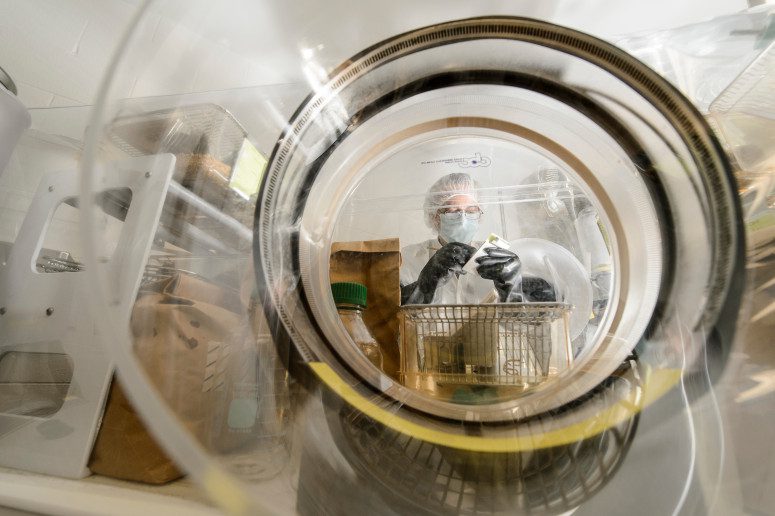08 Jun Bacteria with a taste for an inflammatory compound could help protect against heart disease

Nacho Vivas, lab manager at the Rey Lab in the bacteriology department at the University of Wisconsin–Madison, checks on a group of germ-free mice inside a sterile lab environment on June 22, 2015. Research led by Federico Rey has found some microbes in the guts of humans and mice may help control the buildup of plaque in arteries, the leading cause of cardiovascular disease, by gobbling up a group of inflammatory chemicals before they can circulate in the body. Photo: Bryce Richter
Some microbes in the guts of humans and mice may help control the buildup of plaque in arteries, the leading cause of cardiovascular disease, by gobbling up a group of inflammatory chemicals before they can circulate in the body.
New research from the University of Wisconsin–Madison and collaborators around the world identified bacteria able to break down uric acid in the low-oxygen environment of the intestines and the specific genes that enable the process. They describe a new way in which gut microbes may influence our health and a potential avenue to treat gout or prevent heart disease.
Uric acid is a product of the breakdown in the human body of purines, a class of molecules that include those necessary for life, like adenine and guanine (two of the basic building blocks of DNA), and some that are life indulgences, like caffeine and theobromine (found in chocolate and tea leaves). Most uric acid is cleaned out by healthy kidneys, but about 30 percent of it spills into the gut. Too much uric acid leads to a painful condition called gout.
“When your blood is saturated with uric acid, it starts to form crystals that accumulate in the joints and cause gout,” says Federico Rey, UW–Madison professor of bacteriology and an author of the new study, which was published recently in the journal Cell Host & Microbe. “But before you get enough uric acid to form crystals, even if you have a little bit more uric acid than is normal, it’s promoting inflammation in your body that is correlated with atherosclerosis — plaque building up in your arteries.”
Rey’s lab partnered with researchers in Sweden who analyzed factors including arterial plaque, uric acid levels and microbial communities in the digestive tract in a group of nearly 1,000 people. The amount of uric acid in their bodies ran hand-in-hand with the amount of fats, cholesterol and other stuff calcifying their arteries.



